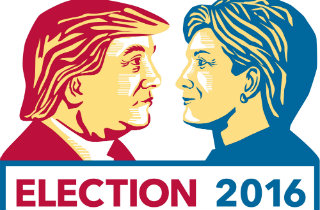 As Electors head to their respective state’s Electoral College meetings today, there is a growing effort underway to get the vote postponed.
As Electors head to their respective state’s Electoral College meetings today, there is a growing effort underway to get the vote postponed.
Last Wednesday, Rep. Don Beyer (D-Virginia) called for a delay of the vote because of the CIA’s reported determination that Russia meddled with the 2016 election to help Donald Trump win. Many of the anti-Trump forces jumped on board. Forty six additional electors have joined an effort demanding a full intelligence briefing on any alleged ties between President-elect Donald Trump and Russian leader Vladimir Putin before they will vote. A survey by YouGov that came out over the weekend said that about 46% of those polled believed that Congress should be allowed to review the hacking allegations before the Electors vote.
But let’s be real here. The voting starts in just hours (and is underway in at least one state). So, the question that we wanted to know as a legal website: Is this even possible? Can they actually postpone the vote? The short answer is yes. The long answer: It would be very,very difficult, and literally take an Act of Congress.
First, let’s explain how the date was set. The Constitution dictates that the Electoral College must meet to vote for President and Vice-Present. The 12th Amendment states:
The Electors shall meet in their respective states, and vote by ballot for President and Vice-President, one of whom, at least, shall not be an inhabitant of the same state with themselves; they shall name in their ballots the person voted for as President, and in distinct ballots the person voted for as Vice-President, and they shall make distinct lists of all persons voted for as President, and of all persons voted for as Vice-President, and of the number of votes for each, which lists they shall sign and certify, and transmit sealed to the seat of the government of the United States, directed to the President of the Senate; The President of the Senate shall, in the presence of the Senate and House of Representatives, open all the certificates and the votes shall then be counted;–The person having the greatest number of votes for President, shall be the President.
But, note there is no date mentioned in the Constitution for when this must happen. Instead, the date for the Electoral College meeting was set by congressional statute 3 U.S.C. 7 which states:
The electors of President and Vice President of each State shall meet and give their votes on the first Monday after the second Wednesday in December next following their appointment at such place in each State as the legislature of such State shall direct.
The law setting the date was passed in 1948, and there has never been a presidential election in which the vote was postponed, according to our research.
“I’m unaware of any previous presidential election in which the date for the meeting of the electors was changed by Congress after the date on which the electors themselves were appointed (i.e., the date that citizens had cast their popular votes in the presidential election) had occurred,” Ohio State University Professor Ned Foley, who serves at the director of election law at the Moritz School of Law, told LawNewz.com.
Even during the contentious 2000 election, the Supreme Court’s decision that resolved the dispute surrounding the election was issued on December 12, 2000. That was six days before the Electoral College was scheduled to meet, and certify George W. Bush as the President.
The U.S. Constitution requires that the electors in each state meet on the same day. As of 10:30 am EST, at least one state has already voted. So, in order to change the date from today, Congress would literally have to intervene and pass a law, which would then have to be signed by President Barack Obama. When Congress adjourns “sine die,” and is not just in recess, President Barack Obama would have the power to reconvene both house, according to Article II, Section 3 of the United States Constitution, for “extraordinary occasions.” The bottom line: It’s possible, but highly unlikely that this date would be moved. But, then again, nothing about the 2016 election has been normal.
A version of this article was first published on December 15th, but has been republished here with new information.